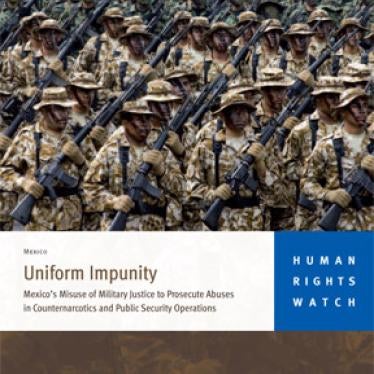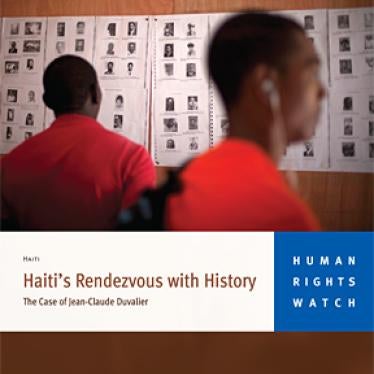The US government significantly strengthened its partnership with Mexico in combating organized crime in 2007 when it announced the Merida Initiative, a multi-year US security assistance package for Mexico. To date, the US government has allocated roughly $1.5 billion in Merida funding to Mexico. From the outset, the US Congress recognized the importance of ensuring that the Mexican government respect human rights in its public security efforts, mandating by law that 15 percent of select Merida funds be withheld until the State Department issued a report to the US Congress which showed that Mexico had demonstrated it was meeting four human rights requirements.
On September 2, 2010, the State Department issued its second report to Congress concluding that Mexico is meeting the Merida Initiative's human rights requirements, and it stated its intention to obligate roughly $36 million in security assistance that had been withheld from the 2009 supplemental and the 2010 omnibus budgets.
However, research conducted by our respective organizations, Mexico's National Human Rights Commission, and even the State Department's own reports, demonstrates conclusively that Mexico has failed to meet the four human rights requirements set out by law. As a result, Congress should not release these select Merida funds. Releasing these funds would send the message that the United States condones the grave human rights violations committed in Mexico, including torture, rape, killings, and enforced disappearances.
We recognize that Mexico is facing a severe public security crisis, and that the United States can play a constructive role in strengthening Mexico's ability to confront organized crime in an effective manner. However, human rights violations committed by Mexican security forces are not only deplorable in their own right, but also significantly undermine the effectiveness of Mexico's public security efforts. Building trust between the Mexican people and the government is essential to gathering information to dismantle organized crime. When security forces commit grave human rights violations and they are not held accountable for their actions, they lose that trust, alienating key allies and leaving civilians in a state of terror and defenselessness. It is thus in the interest of both of our countries to help Mexico curb systematic human rights violations, ensure that violations are effectively investigated and those responsible held accountable, and assess candidly the progress Mexico is making towards improving accountability and transparency.
Evidence demonstrates that Mexico is not fulfilling effectively any of the requirements established by Congress, particularly those dealing with prosecuting military abuses and torture:
Requirement: Ensuring that civilian prosecutors and judicial authorities are investigating and prosecuting members of the federal police and military forces who have been credibly alleged to have violated human rights.
Since 2007, Mexico's National Human Rights Commission has received over 4,000 complaints of human rights violations committed by members of the military, including extrajudicial executions, rape and torture. As the State Department recognizes in a report it issued to Congress on July 29, 2010, Mexico's military justice system continues to "systematically claim" jurisdiction over the investigation of these cases. This same report noted that while "information on military prosecutions is difficult to obtain," the "limited information on military prosecutions and complaints filed suggest that actual prosecutions are rare."
Indeed, according to the Mexican military's own most recent report, military courts have only sentenced one soldier for a human rights violation committed since 2007. Not a single soldier has been prosecuted in civilian courts since the Merida Initiative came into effect in July 2008. In this sense, the State Department's assertion in its September 2010 report that civilian prosecutors are investigating and prosecuting members of the military accused of human rights violations is inaccurate. To date, no bill has been introduced in the Mexican Congress to amend this practice.
Requirement: Enforcing the prohibition on the use of testimony obtained through torture.
The State Department's September 2010 report lists several actions undertaken by the Mexican government to address torture, some of which have been in effect for several years. However, these measures have failed to curb the systematic practice of torture to obtain confessions. According to the State Department's 2009 Country Report on Human Rights Practice in Mexico, Mexican judges "continued to allow statements coerced through torture to be used as evidence against the accused, a practice particularly subject to abuse because confessions were often the primary evidence in criminal conviction."
Several of our organizations have documented cases illustrating the systematic use of torture by the military and police in Baja California, Guerrero and Chihuahua, among other states. Among the tactics documented are the use of electric shocks, beatings, and suffocation with plastic bags. Meanwhile, the practice of arraigo-which allows public prosecutors to detain a suspect for up to 80 days before they are charged with a crime-creates an environment that, in documented cases, facilitates torture.
The Constitutional reforms of June 2008, which should in theory help reduce the use of torture to obtain confessions, legally have not yet entered into force in the majority of Mexico's states. Binding jurisprudence that is currently in force does not require confessions to be made in the presence of a judge, and thus allows the continued systematic use of torture and other abuse to obtain confessions used in court.
Requirement: Improve the transparency and accountability of federal police forces and work with state and municipal authorities to improve the transparency and accountability of state and municipal police forces.
While Mexico has undertaken some important public security reforms, the Government has neither created effective accountability mechanisms for police nor adequately involved citizens' participation in evaluating their performance. For example, the June 2009 legislation creating the new Federal Police force focuses exclusively on internal disciplinary mechanisms for investigating allegations of human rights violations, and it does not provide clear guidelines for when such complaints should be passed along to civilian prosecutors for criminal investigations or to Mexico's National Human Rights Commission. The law also does not include mechanisms to ensure transparency in the investigation, hearing, and sanction of a disciplinary issue, and it does not specify if or how the results of a complaint will be made public.
Requirement: Conduct regular consultations with Mexican human rights organizations and civil society on recommendations for the implementation of the Merida Initiative.
Mexican authorities have failed to implement a consultation process that engages human rights groups and other civil society organizations in a true dialogue about the Merida Initiative. According to the Mexican organizations who coauthored this memo, the meetings are almost exclusively held in Mexico City, severely limiting the ability of groups from diverse regions of the country to participate; the Government of Mexico only notifies select groups of meetings only days in advance, if at all, and the meetings are rarely open to members of the public; groups are not invited to help shape the meetings' agenda, which is set exclusively by the Mexican government, or to determine their format; there are no clear guidelines for providing meaningful input regarding the implementation of the Merida Initiative; and there has been no follow-up on recommendations made by civil society groups. As a result, many Mexican civil society groups have stopped participating in these meetings.
The human rights requirements in the Merida Initiative offer a key tool for improving both human rights and public security in Mexico. So long as Mexico fails to meet the human rights requirements set out in the law, as evidence clearly demonstrates is the case, Congress should withhold the select funds. Doing so will strengthen the rule of law and bolster security on both sides of the border.
In its September 2010 report, the State Department stated that, "it will be the policy of the Department with respect to Mexico not to obligate at this time the FY2010 Supplemental INCLE funds currently being withheld," (roughly $26 million) contingent on two events: the passage of human rights reforms to the Mexican constitution, and the introduction of a proposal to reform the Military Code of Justice, which would limit the crimes that can be tried in military courts.
While the State Department's efforts to press for a reform of military jurisdiction and human rights reforms complements the objectives of the Merida Initiative, and are steps in the right direction, it is important to underscore that neither of these steps will alone ensure fulfillment of the human rights requirements. Therefore, we believe that the funds in the 2010 Supplemental budget should also be pegged to compliance with the four human rights requirements-which measure not only changes in law, but in practice.







